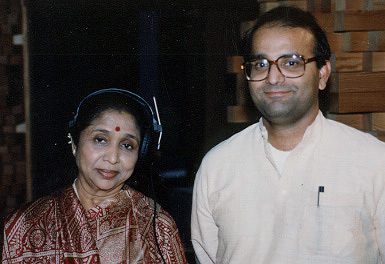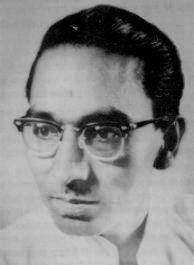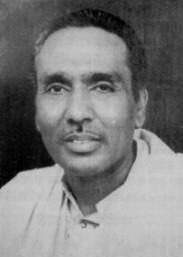by Rajan P. Parrikar
First published on SAWF on October 2, 2000

Rajan Parrikar and Asha Bhonsle in Marin County, California (1995)
Photo: Rana Bose
Namashkar.
Laxmanprasad Jaipurwale (1915-1977) is an unknown entity today. He was a superlative musician – a vocalist and a composer of a high calibre, a representative of what is known as the “Kunwar Shyam” tradition. The progenitor of this lyrical and layakari-laden gayaki was Goswami Lalji Maharaj (‘Kunwar Shyam’).
A recluse who sang only within the precincts of Delhi’s Radha-Govind temple, the saint-musician-composer Kunwar Shyam (died c. 1911) has left behind a rich fund of compositions. We have earlier encountered his exquisite creation – recall the Chhaya Malhar renditions of Ramashreya Jha “Ramrang” and Bhimsen Joshi in A Tale of Two Malhars. In this feature we shall acquaint ourselves with some more.
Laxmanprasad’s recordings are today hard to come by. He lived what we, in these times, may view as an existence unburdened by financial and self-marketing savvy. His eldest son, Govindprasad Jaipurwale (1944-1988), excelled as a vocalist but was snatched away before his time. Between the two of them they gave taleem to scores of professional musicians. Some names that come to mind are: Rajdulari Khan (second wife of Ali Akbar Khan), Sudha Malhotra, Kavita Krishnamurthy, Ronu Majumdar, Meenu Purshottam, Aarti Mukherjee, Manhar, Ajit Kadkade, Chandrasekhar Gadgil and several other not-so-well-known but competent musicians.

Laxmanprasad Jaipurwale
Laxmanprasad’s only surviving son, Girdharprasad, today struggles to collect and put together the shards of his father’s oeuvre. Girdharprasad specializes in the tabla but is also skilled in the melodic department. In the face of considerable odds he has brought to light two volumes of Sangeet Gyan Prakash detailing the notated compositions of Laxmanprasad Jaipurwale and Kunwar Shyam.
Girdharprasad recently made available to me his father’s recordings – most of them unpublished, and a couple from an old Polydor LP. In addition, we also have at hand a few selections of Govindprasad.
Laxmanprasad’s preferred accompanists for the tabla were Taranath Rao and Habibuddin Khan, and for the harmonium, Manohar Chimote and Madan Prakash – all adepts in their respective domains. The clips lined up throw open a window to the rich artistry of an unusually gifted man, today all but forgotten.
We kick off with a vilambit khayal in Raga Bhatiyar followed by a druta rendition, both compositions of Laxmanprasad himself.
Next, a Gunakree (Gunakali) cheez set to Roopaka tala, again LPJ’s own.
Raga Kafi, a Laxmanprasad composition.
Kunwar Shyam was a specialist in the varieties of Malhars. A couple of bandishes in the aprachalita Raga Suha Malhar, an amalgam of Suha and Soor Malhar (this rendition should be more appropriately called Sughrai Malhar), follow.

Govindprasad Jaipurwale
Moving along, a bandish in Pooriya Kalyan.
The Laxmanprasad segment concludes with an elegant Mishra Khamaj thumri which in the latter half morphs into a ragamala.
We now turn to Govindprasad who was particularly proficient in the lighter forms such as ghazal and thumri. Afficionados of Vividh Bharati will have memories of him from the 1970s.
Govindprasad begins with an invocation to Saraswati in Raga Hamsadhwani. The composer is his father.
Next, a ghazal.
The final item, a thumri: muraliwale Shyam.
